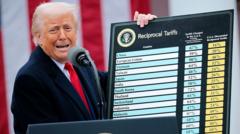Tensions between the US and Canada are escalating surrounding Machias Seal Island, a maritime area of dispute known as the "Grey Zone." The conflict, rooted in a historical territorial claim over local lobster fisheries, has become increasingly strained amid President Trump’s rhetoric and policies that suggest American aspirations towards Canadian resources. As both nations navigate this politically charged environment, the fishing industry feels the brunt of the confrontation.
The International Lobster Dispute: USA and Canada’s ‘Grey Zone’ Tensions

The International Lobster Dispute: USA and Canada’s ‘Grey Zone’ Tensions
A look at the ongoing territorial conflict between the US and Canada over Machias Seal Island amidst shifting political dynamics, particularly under Donald Trump's administration.
The waters surrounding Machias Seal Island, a small and uninhabited landmass situated between the United States and Canada, have long been a contested territory, exemplifying a rare international dispute known as the "Grey Zone." Both nations claim ownership of the island and the lucrative fishing rights in its surrounding waters—particularly for the local lobster industry—which has led to years of tension. American lobsterman John Drouin recalls fierce competition among fishermen, stating that injuries resulting from clashes are not uncommon.
The struggle for sovereignty over approximately 277 square miles of sea kicked off in the late 1700s and intensified after a 1984 international court ruling that allowed both countries to fish in the area. This dispute has remained a relatively obscure point of tension for decades until current political dynamics under former US President Donald Trump began reshaping perspectives on Canadian territory.
The quaint town of Cutler, Maine, right next to the Grey Zone, serves as a microcosm for the escalating tensions experienced by fishermen. Locals often cite thefts of traps and competing regulations as sources of friction. Lobsterman Nick Lemieux reported losing traps to Canadian competitors, attributing these issues to perceived advantages in Canadian fishing rights and regulations.
Despite a historically cordial relationship, Trump's administration marked a severe shift in discourse. His statements referring to Canada as the "51st state" and open remarks about claims on Canadian resources illustrate an aggressive stance. In the wake of new tariffs on Canadian imports, questions about longer-term territorial ambitions surfaced. Trump's concerns seem focused on Canadian natural resources, raising fears of annexation or an outright takeover—a notion Prime Minister Justin Trudeau mentioned as a genuine concern.
Incidents in the region highlight growing disputes over water rights, as the US has also intriguingly suggested utilizing Canadian water sources for its own states. These increasingly bold claims reflect a broader strategy by the Trump administration focused on consolidating US assets and reshaping its geographic alliances in a post-World War Two world, which previously prioritized broader international cooperation.
As international relations unfold, the historic trust in cross-border partnerships appears fractured. Canadians, facing rising tensions, respond with a boycott of US goods and canceling trips south, indicating a potential backlash against perceived aggressions. Commentators suggest that as both nations navigate these stormy waters, unforeseen consequences may arise, and the possibility that the rift might deepen remains looming.
Recent remarks from Canadian leaders, such as Mark Carney, emphasize a rejection of US domination. The Liberal Party frames ongoing discussions about resources within the context of the balance of power, advocating cooperation instead of conflict. Meanwhile, experts speculate whether Trump's ambitions reflect a coherent strategic vision or are mere improvised whims.
Ultimately, the future of US-Canada relations hinges on complex historical grievances and modern-day political maneuvers, as both sides seek to establish their footing amidst a changing and increasingly contentious landscape. The Grey Zone marks more than just a fishing ground; it’s a flashpoint encapsulating a broader geopolitical struggle in North America and potentially beyond.






















